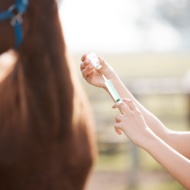Charity provides emergency care to Gaza equines
The charity has provided care for around 800 donkeys and horses in Gaza.
Safe Haven for Donkeys, a UK charity, has been providing emergency care to equines caught up in the conflict in Gaza.
Donkeys and horses have become the main mode of transport in Gaza, due to a lack of fuel and vehicles being destroyed. They are being used to move people and carry food, water and other supplies.
The conditions they are having to work in mean that the animals are at risk of injury from military activity as well as suffering from dehydration, malnourishment, and injuries such as harness wounds from pulling heavy loads.
The charity’s team, led by Dr Saif, has been providing veterinary care in Gaza since April.
Conditions have been difficulty and it has been a challenge for the team to get the veterinary medicines they need. An aid shipment from Safe Haven took four months to cross the border at Rafah.
Dr Saif said: “We do not have enough supplies. We have very basic provisions and are running on an emergency basis.
“We have maybe 60 per cent to 70 per cent of medications available to us, but they are so expensive, and we often have to travel far, even up to 20 kilometres, to get them.
“It is hard to access them, because of the distance and because of us having to go by donkey, which then takes hours.”
The team provides its care from a mobile clinic that it sets up by the side of the road. So far, the charity has treated around 800 donkeys and horses, as well as treating other farm animals that are brought to the clinic.
Dr Saif added: “There’s certainly very good improvement to the majority of cases we’ve treated. It’s important to mention that we have done all this even though we don’t have enough equipment and medicine.”
Safe Haven for Donkeys was set up in 2000 and cares for working and abandoned donkeys in Israel, the Palestinian territories, and Egypt.
More information about the charity’s work in Gaza can be found here.
Image © Safe Haven for Donkeys



 Zoetis UK has apologised for a supply shortage of Equip Artervac, caused by a manufacturing issue.
Zoetis UK has apologised for a supply shortage of Equip Artervac, caused by a manufacturing issue.